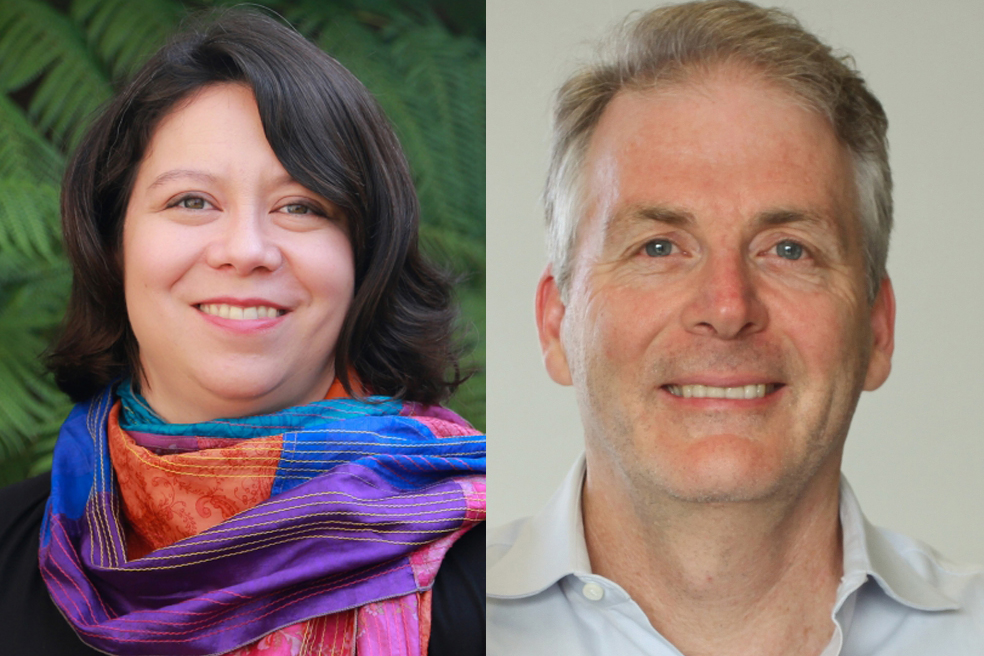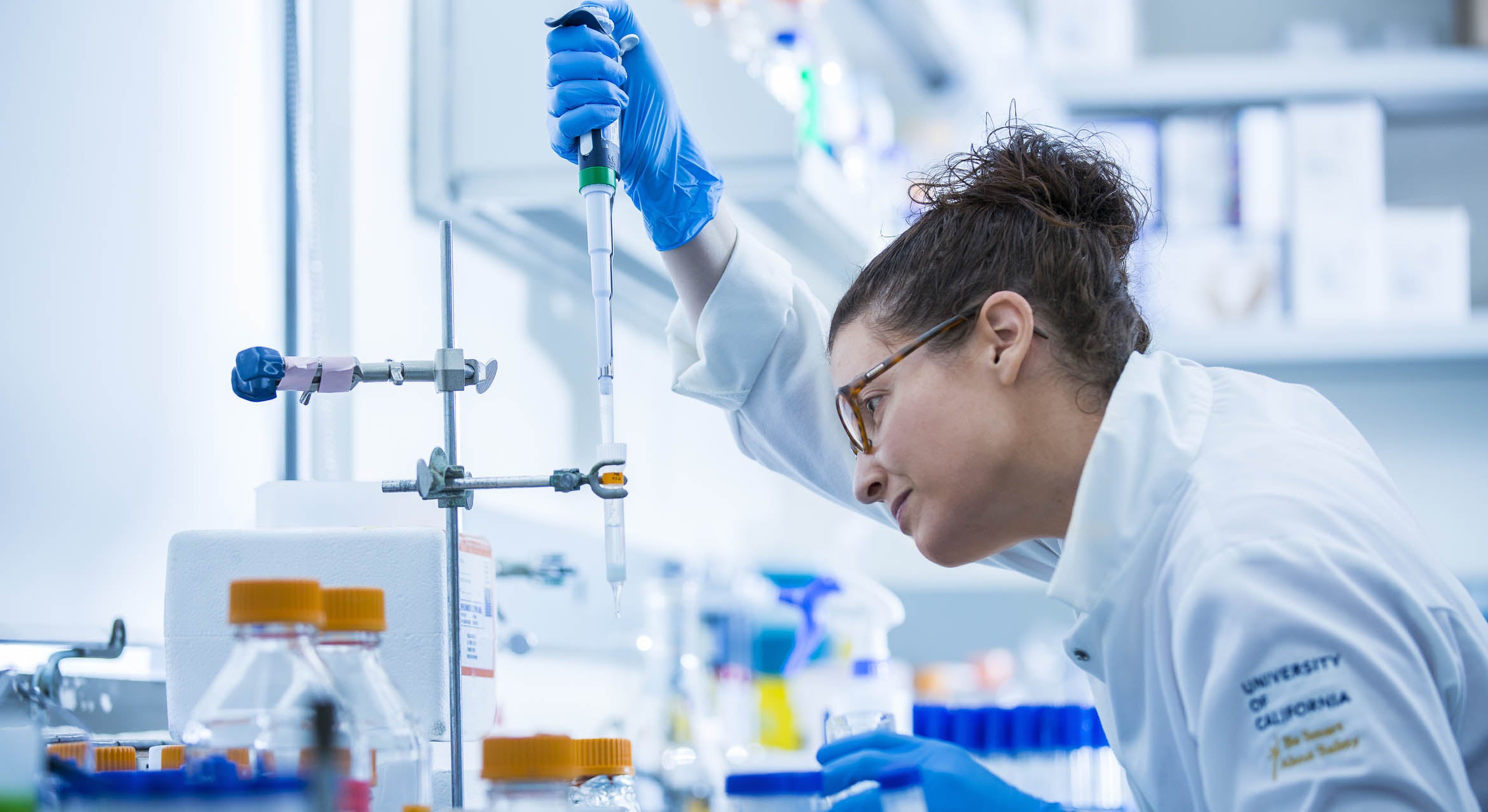
At the Frontier of Research
Two UC Santa Barbara engineers are among 129 new members worldwide elected to the National Academy of Engineering (NAE) for 2021. Materials and chemistry professor Craig Hawker and Rachel Segalman, chair of the Chemical Engineering Department, join the 106 American and 23 foreign engineers honored this year. Election to the NAE is among the highest professional distinctions accorded to an engineer.
Segalman, the Edward Noble Kramer Professor and a professor of both chemical engineering and materials, was recognized “for contributions to semiconducting block polymers, polymeric ionic liquids and hybrid thermoelectric materials.”
Hawker, the Alan and Ruth Heeger Chair in Interdisciplinary Science, who also serves as the director of the California NanoSystems Institute (CNSI) and the Dow Materials Institute, was cited for ”contributions to polymer chemistry through synthetic organic chemistry concepts and the advancement of molecular engineering principles.”
“Our campus is thrilled to congratulate Professor Craig Hawker and Professor Rachel Segalman on their election to the world-renowned National Academy of Engineering,” said UC Santa Barbara Chancellor Henry T. Yang, who was elected to the NAE in 1991. “Election to the NAE by one's peers is among the highest professional honors in engineering, and recognizes years of accomplishment having significant impact on health and the quality of life. Both Craig and Rachel have distinguished themselves as pioneers in their fields, and we take tremendous pride in their frontier research contributions."
“The College of Engineering is extremely proud and honored to have two highly distinguished faculty members elected to the National Academy of Engineering,” said Rod Alferness, dean of the UCSB College of Engineering, who was elected to the NAE in 2003. “Professor Segalman and Professor Hawker have made pioneering contributions to the areas of structural control over soft matter and synthetic polymer chemistry, respectively. In addition, they are inspirational leaders in their departments and at the university, and outstanding mentors to colleagues and students. Their scientific discoveries and innovation will drive their fields of engineering and positively impact society for years to come.”
With particular interests in energy, efficiency, sustainability, and materials and interfaces, Segalman’s research focuses on controlling self-assembly, structure and the properties in functional polymers. Structural control over soft matter through microscopic length scales is an essential tool to optimize properties for applications ranging from solar and thermal energy to biomaterials. Her work paves the way for the development of sophisticated materials for energy application such as photovoltaics, fuel cells and thermoelectrics.
“The perception is that this is an individual honor, but I see it as a recognition for the university and the decades of wonderful people who I’ve been able to work with,” said Segalman, referring to her collaborators, colleagues, mentors, students and supportive staff. “I also believe our selection is a testament to UCSB’s collaborative culture for creating an environment that allows scientists and students to be inspired together and pursue research in new directions.”
Segalman’s lab participates in numerous collaborative research groups at UCSB through the Materials Research Laboratory, the Mitsubishi Chemical Center for Advanced Materials, and the Institute for Collaborative Biotechnologies. Her research group also partners with researchers at UCSB and other institutions through Synthetic Control Across Length-Scales for Advancing Rechargeables, the Center for Materials for Water and Energy Systems, and the BioPolymers, Automated Cellular Infrastrucutre, Flow and Integrated Chemistry Materials Innovation Platform.
A recipient of multiple honors throughout her career, Segalman also is an elected a fellow of the American Academy of Arts and Sciences and the American Physical Society (APS). Her additional awards include the prestigious Presidential Early Career Award for Scientists and Engineers, the highest honor bestowed by the U.S. government to early-career scientists and engineers; the National Science Foundation’s Early CAREER Award; and the Dillon Medal from APS. Segalman received her bachelor’s degree in chemical engineering from the University of Texas at Austin and her Ph.D. in chemical engineering from UCSB.
Hawker’s research activities focus on synthetic polymer chemistry, integrating cross-disciplinary studies to develop nanostructured materials having unique physical and mechanical properties for applications in biomaterials and energy research. His groundbreaking work has formed the basis for more than 80 U.S. patents and 10 startup companies. A number of these companies have developed drugs to improve the quality of life for people who suffer from chronic kidney disease. Last year, he received the American Chemical Society’s Kathryn C. Hach Award for Entrepreneurial Success in recognition of his “innovative leadership in creating, developing and commercializing revolutionary polymer-based therapeutics and personal care products through multiple successful start-up companies.”
“I am thrilled by this honor, especially when I think about all of the people over the years who made this happen, including Ed Kramer, who was Rachel’s graduate advisor at UCSB and a huge reason why I joined the faculty at UCSB,” said Hawker, who is also an elected fellow of the Royal Society, the National Academy of Inventors and the American Academy of Arts and Sciences. “Our election reflects the university’s status as a leader in materials and polymer science. It also shows UCSB’s unique collaborative culture where great science and engineering are built on a tradition of working across boundaries. The sum is certainly greater than any individual research success.”
Hawker received a bachelor’s degree in chemistry from the University of Queensland, and his Ph.D. from the University of Cambridge, after which he completed postdoctoral research at Cornell University. He joined UCSB in 2004 after a decade as a researcher with IBM.
Individuals in the newly elected class will be formally inducted during the NAE’s annual meeting Oct. 3, 2021.



